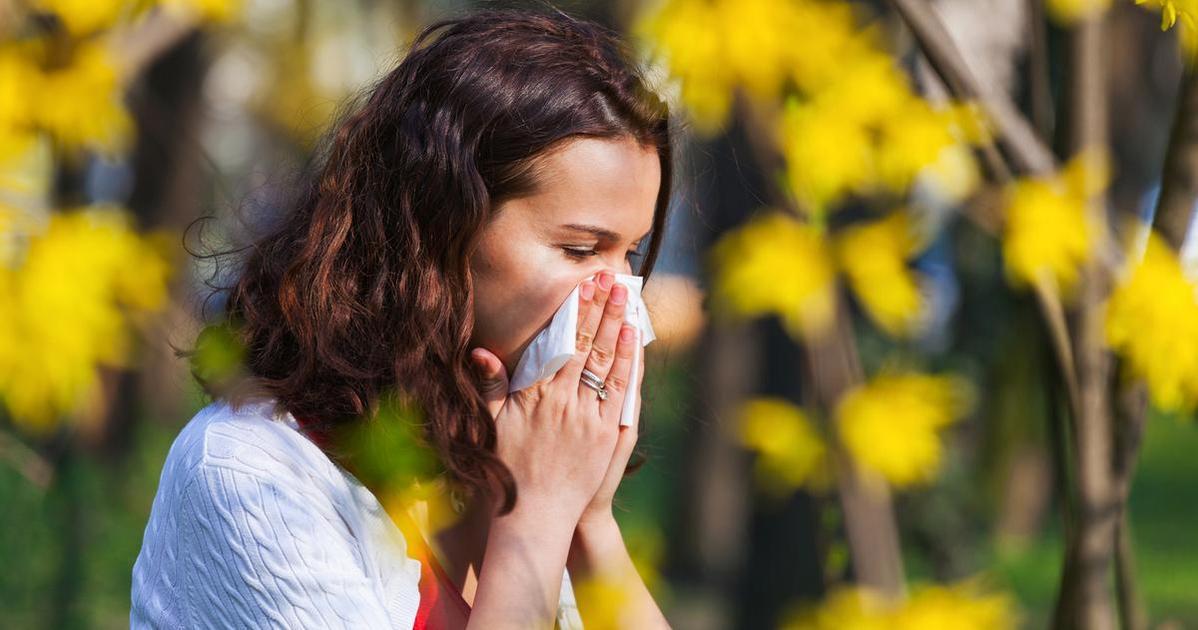Plants are simply attempting to propagate. Our immune systems are simply working to protect us. Pollen allergies are widespread, with flowers and trees blooming abundantly.

Seasonal allergies cause many people to suffer from sneezing, dry eyes, and runny noses. Around 25 % of adults in the United States experienced seasonal allergies in 2021, as reported by the CDC. The symptoms are becoming more intense and lasting for a longer period of time. The longer growing season due to climate change means more pollen is produced by plants, exposed to higher levels of carbon dioxide. Why do many people have negative reactions to small particles that are not intended to be harmful to humans? All of this is a result of the world our immune system is trying to navigate.
According to allergist Mansi Kanuga from Mayo Clinic Health System, the immune system is highly intricate and faces a challenging task. Our ability to identify potential threats and respond accordingly, as well as knowing when to relax, is essential.
The human immune system is made up of two main parts: the granulocyte, which happens to be a type of cell, and the lymphocyte, an additional type of cell. Any substance from outside the body causes a widespread response. At the same time, the second one reacts to particular substances that the body has previously been exposed to. If the immune system encounters such threats once more in the future, it will be able to recall and allocate resources to combat them. An allergen is any substance that leads to a particular immune response because it triggers allergies. Maya Jerath, an allergist at Washington University School of Medicine and Barnes-Jewish Hospital, stated that individuals are able to develop allergies to any type of protein.

The exact cause of how allergies develop is still not completely understood, but scientists have identified some plausible explanations. Kanuga explains that scientists understand babies are not born with predetermined allergies, and these allergies can develop or disappear at any point in an individuals life. Evidence suggests that genetics may also play a part in this. If parents have allergies, there is a higher likelihood that their children will also have allergies.
The immune system’s response to a substance at the beginning influences the development of allergies. The system may view the substance as a potential threat if it is highly reactive. Allergies can be influenced by various ways of being exposed to allergens. For instance, the immune system is much more familiar with encountering brand new substances through the gut, making it less reactive when compared with substances introduced through the skin, which has less exposure to external material.
Why does pollen have such a strong impact on the immune system? In the end, plants have specific ways to protect themselves from being eaten by animals, like thorns and unpleasant-tasting substances, that do not cause seasonal allergies. The pollen compound is a chemical substance that plants use for reproduction, similar to sperm in the botanical world, and it was not created to protect humans from predators. “You aren’t the target; Nabarun Ghosh, a biologist at West Texas A&M University who researches allergens, states that they are not trying to trigger the allergic reaction.
Your immune system might not want to hear this explanation. Adjusting to pollen can be challenging because it is only present in the environment during certain times of the year, rather than being consistently available. Furthermore, the minuscule pollen particles that trigger allergies can efficiently penetrate beyond the nasal passage and into the lower respiratory system. In most cases, allergies form when the immune system reacts to an allergen upon initial exposure. The conditions are not caused by any specific attribute of pollen.

IgE, also known as Immunoglobulin E, is a protein that plays a role in triggering allergic reactions to environmental factors. In the beginning phases of an allergy, IgE molecules are created that have the ability to attach to the particular allergen. When the allergen is encountered by the immune system once more, it triggers the release of IgE proteins that attach to the outer layer of the body’s defensive mast cells, acting as sentinels. When a scout IgE attaches to an allergen, the mast cell emits a mixture of substances, such as histamines, which lead to symptoms like congestion, watery eyes, and sneezing. The strongest allergic reaction tends to be in the area of the body where allergen was most commonly encountered, such as when pollen is inhaled, causing a runny nose or watery eyes.
A lot of people dislike IgE and mast cells, but they participate in a crucial role in the immune system by defending against parasitic infections. It is common for modern humans to not come across these dangers frequently, which can lead to the perception of allergies as an exaggerated response.
Emily Weis, allergist at the University of Rochester Medical Center, explains that allergies are caused by the immune system of the body believing it is doing the proper thing. The immune system continuously works to distinguish between the body’s own cells and foreign substances. That is what has helped us to survive.
Allergy sufferers will find that to be cold comfort. “seasonal allergies can really impact our quality of daily life, especially if we are dealing with chronic pain,” Kanuga said. She, along with Weis and Jerath, present a three-part strategy for dealing with allergies.
Try to reduce contact with substances that you are allergic to whenever you can. This may involve checking the pollen levels in your area before deciding to go outside and keeping your windows shut to prevent pollen from entering your home. If you are experiencing symptoms like teary eyes, sneezing, or itchiness, you can alleviate them by using antihistamines or other over-the-counter medications.
If none of these methods work for you, your best bet is to visit your allergist and get a recommendation for an allergy shot. These injections contain a small amount of the substances you are allergic to and work to gradually build up your body’s tolerance to them, reducing your immune system’s sensitivity. In the United States, there are also tablets available for immunotherapy against grass and ragweed pollens and dust mites.

Results will not be immediate; they require time and patience to become apparent. Jerath explains that it may take approximately six months for symptoms to begin improving with allergy shots, and the full treatment course typically lasts around five years. She states that this approach can successfully decrease allergies rather than just addressing their symptoms, which is quite remarkable. “It’s quite astonishing,” she comments, “to consider the idea that the immune system can be effectively retrained.”
